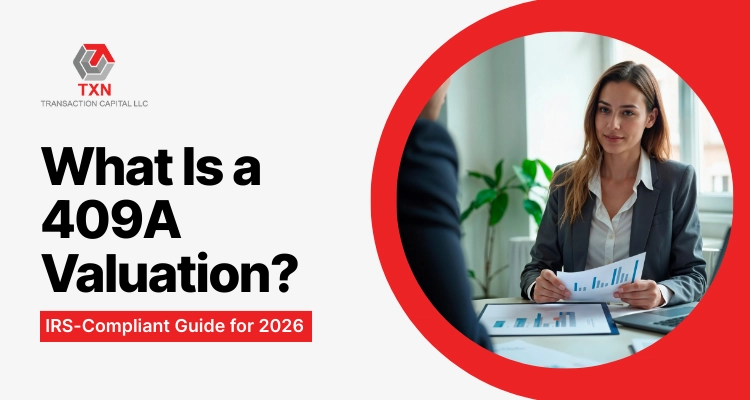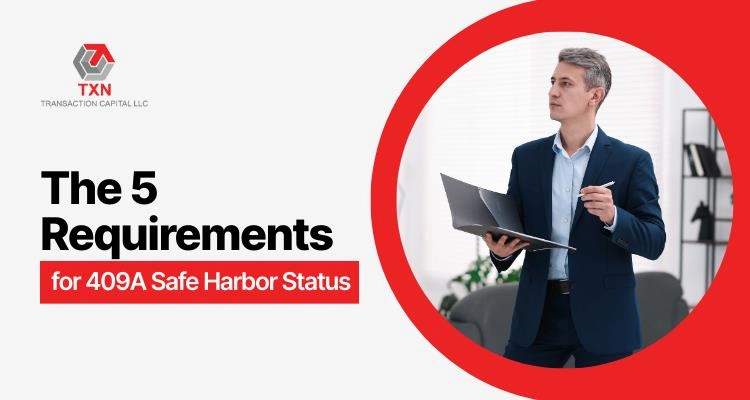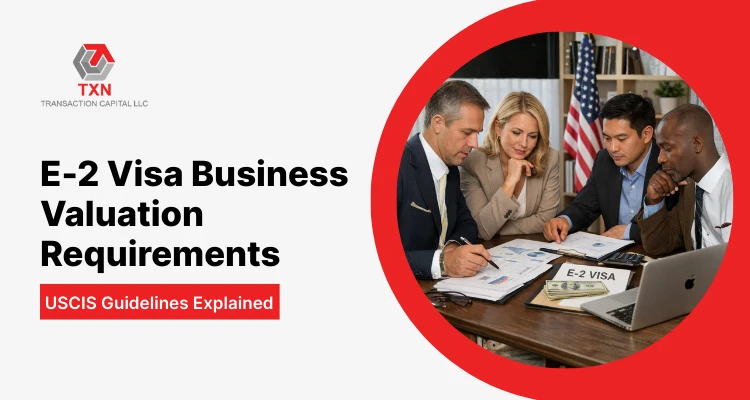Why Fair Market Value (FMV) in Your 409A Valuation Can Make or Break Your Startup: A Complete Guide

When you’re ready to reward employees with stock options, one foundational question defines your equity compensation strategy: How do you determine the legally compliant strike price? The answer lies in Fair Market Value (FMV)—the IRS-mandated pricing methodology that protects your startup from devastating tax penalties while building employee trust and investor confidence.
A proper 409A valuation determines Fair Market Value for common stock options, ensuring IRS compliance and protecting both your company and employees from significant tax penalties and legal risks.
What is Fair Market Value in 409A Valuations?
Fair Market Value (FMV) represents the price that a knowledgeable, willing buyer and seller would agree upon in an arm’s length transaction, with neither party under duress. For 409A valuations, FMV specifically applies to common stock—not the preferred shares sold in VC funding rounds.
Key Differences: Common vs. Preferred Stock
| Feature | Common Stock (FMV) | Preferred Stock (VC Price) |
|---|---|---|
| Liquidation Rights | Last in line | First priority |
| Voting Rights | Limited | Enhanced |
| Anti-dilution Protection | None | Full protection |
| Dividend Rights | Residual only | Preferred + participating |
| Conversion Rights | N/A | Optional conversion |
This fundamental difference explains why your 409A FMV is typically 10-40% lower than your latest VC valuation.
IRS Section 409A Requirements Explained
Section 409A of the Internal Revenue Code mandates that stock options must be granted at or above Fair Market Value to avoid severe tax consequences.
Penalties for Non-Compliance
If options are granted below FMV:
- Immediate taxation upon vesting (not exercise)
- 20% penalty tax on top of ordinary income tax
- Retroactive interest charges from vesting date
- Loss of IRS safe harbor protection
- Potential company-wide audit exposure
Safe Harbor Protection
Independent 409A valuations provide safe harbor protection, meaning the IRS presumes your FMV is correct unless they can prove it’s “grossly unreasonable”—a high legal standard that protects your company.
409A Valuation Methods Explained
1. Income Approach
Certified valuation experts employ three primary approaches, often using multiple methods for cross-validation:
Best for: Revenue-generating startups with predictable cash flows
- Discounted Cash Flow (DCF): Projects future cash flows discounted by company-specific risk rates
- Capitalization of Earnings: Uses normalized earnings and growth rates for stable businesses
2. Market Approach
Best for: Companies in active M&A markets with comparable transactions
- Guideline Public Company Method (GPCM): Compares financial metrics to similar public companies using multiples like EV/Revenue, EV/EBITDA
- Guideline Transaction Method (GTM): Analyzes recent M&A transactions for comparable private companies
3. Asset Approach
Best for: Early-stage startups or asset-heavy businesses
- Adjusted Net Asset Value: Calculates fair value of assets minus liabilities
- Liquidation Value: Conservative approach assuming immediate asset liquidation
Equity Allocation Methods
After determining enterprise value, professionals allocate value among equity classes:
- Option Pricing Model (OPM): Treats equity as call options on company value
- Probability-Weighted Expected Return Method (PWERM): Models different exit scenarios with probability weightings
- Hybrid Method: Combines OPM and PWERM for complex capital structures
Why FMV Differs from VC Valuations
Ever wonder why your 409A number is dramatically lower than the VC valuation? Understanding this gap is crucial for managing expectations:
VC Valuation Purpose
- Goal: Attract investment and signal growth potential
- Perspective: Optimistic future value with near-term exit assumption
- Stock Type: Preferred shares with protective rights
- Liquidity: Assumes active exit market
409A FMV Purpose
- Goal: Conservative, audit-defensible compliance
- Perspective: Present value with no assumed exit timeline
- Stock Type: Common shares without preferences
- Liquidity: Assumes no immediate liquidity (30-50% discount)
Key Drivers of the Valuation Gap
- Stock Differences: Preferred stock holds higher rights; common stock does not
- Liquidity Assumptions: VCs expect a near-term exit; FMV assumes none, adding a significant illiquidity discount
- Purpose Drives Perspective: VC valuations aim to attract investment; FMV needs to survive IRS audit scrutiny
Typical Valuation Gaps by Stage
| Company Stage | VC Premium Over FMV | Primary Drivers |
|---|---|---|
| Seed Stage | 200-400% | High growth assumptions, limited comparables |
| Series A | 150-250% | Market validation, reduced execution risk |
| Series B+ | 100-150% | Proven business model, clearer exit path |
| Pre-IPO | 50-100% | Approaching liquidity event |
Can Your Board Set FMV? Yes—But With Serious Caveats
Technically, your board of directors may set Fair Market Value internally—but doing so removes IRS safe harbor protection. That puts liability squarely on the company in the event of an audit unless:
Requirements for Board-Determined FMV
- Valuation Expertise: Board members must have demonstrable valuation credentials and experience
- Full Documentation: The methodology must be completely documented with supporting analysis
- Transparent Process: Comparables, dilution scenarios, and capitalization must be transparently managed and justified
- Regular Updates: Board must maintain current valuations and update for material events
Why Most Startups Choose Independent Valuations
For most startups, it’s significantly safer and more credible to hire a certified valuation firm. The cost of professional valuation ($500-$2,000) is minimal compared to potential IRS penalties and audit costs.
Critical Dilution Scenarios You Cannot Ignore
A compliant Fair Market Value must reflect the fully diluted capitalization table. Failing to account for all potential dilution leads to inflated per-share values and invites IRS scrutiny—plus surprised employees when reality hits.
Essential Dilution Components
Employee Stock Option Plans (ESOP):
- Current granted options
- Authorized but unissued option pool
- Anticipated future pool expansions
Convertible Securities:
- Convertible notes with various conversion triggers
- Convertible notes with various conversion triggers
- Convertible preferred stock
Other Dilutive Instruments:
- Warrants with different exercise prices and terms
- Earn-out provisions tied to performance milestones
- Future financing obligations and down-round protections
Waterfall Modeling Requirements
Leading valuation firms run comprehensive dilution waterfall modeling to ensure accuracy across multiple scenarios:
- Current Scenario: Existing cap table as-is
- Full Dilution: All authorized securities converted/exercised
- Financing Scenarios: Impact of anticipated future rounds
- Exit Scenarios: Liquidation preferences and payout waterfalls
Failing to model these scenarios properly can result in FMV determinations that don’t hold up under audit scrutiny.
409A Valuation Process & Timeline
Step-by-Step Process
Week 1: Information Gathering
- Complete valuation questionnaire
- Provide financial statements (3 years)
- Share cap table and legal documents
- Submit business plan and projections
Week 2: Analysis & Modeling
- Perform comparable company research
- Build financial models and scenarios
- Apply appropriate valuation methodologies
- Conduct preliminary equity allocation
Week 3: Review & Finalization
- Internal quality review and validation
- Draft report preparation
- Client review and feedback incorporation
- Final report delivery
Typical Timeline by Complexity
| Complexity Level | Timeline | Characteristics |
|---|---|---|
| Simple | 3-5 business days | Single class common, minimal debt |
| Standard | 5-7 business days | Multiple equity classes, convertible notes |
| Complex | 7-10 business days | SAFE notes, warrants, complex preferences |
| Highly Complex | 10-15 business days | Multiple conversion triggers, earn-outs |
Factors Influencing Your FMV
A comprehensive 409A valuation considers multiple value drivers:
Step-by-Step Process
- Revenue Growth: Year-over-year and projected growth rates
- Gross Margins: Product pricing power and unit economics
- Path to Profitability: Timeline and strategy for achieving positive cash flow
- Burn Rate: Monthly cash consumption and runway analysis
Business Quality Factors
- Customer Concentration: Revenue diversification and customer retention
- Competitive Position: Market share, differentiation, and defensibility
- Intellectual Property: Patents, trademarks, and proprietary technology
- Management Team: Experience, track record, and depth
Market & Industry Conditions
- Total Addressable Market (TAM): Size and growth of target market
- Industry Multiples: Current trading and transaction multiples
- Regulatory Environment: Compliance requirements and regulatory risks
- Macroeconomic Factors: Interest rates, inflation, market sentiment
Capital Structure Considerations
- Outstanding Securities: All classes of stock, options, warrants
- Convertible Instruments: SAFE notes, convertible debt terms
- Liquidation Preferences: Investor protection and payout waterfalls
- Anti-dilution Provisions: Impact on future fundraising scenarios
When to Update Your 409A Valuation
IRS-Required Updates
Annual Requirement: New valuation every 12 months minimum
Material Events Triggering Immediate Updates:
- Financing Events: New funding rounds, debt raises, major investments
- Business Milestones: Product launches, major customer wins/losses
- Organizational Changes: Key executive departures, acquisitions
- Financial Performance: Significant revenue/loss variances from projections
- Market Conditions: Industry disruption, competitive threats
- Legal Issues: Litigation, regulatory actions, IP disputes
Strategic Update Timing
Optimal Timing Considerations:
- Pre-Fundraising: Establish baseline before investor negotiations
- Post-Milestone: Capture value from major achievements
- Pre-IPO Planning: Align with S-1 preparation timeline
- M&A Preparation: Support transaction readiness
Skip 409A Compliance? Feel the Consequences
The penalties for 409A non-compliance are severe and can cripple your startup’s growth trajectory:
Direct Financial Impact
- IRS audits with extensive documentation requirements
- Back taxes and interest calculated from vesting dates
- 20% penalty taxes on affected employees
- Loss of safe harbor protection exposing ongoing audit risk
Business Operation Damage
- Legal disputes and employee lawsuits over tax liabilities
- Low team morale from unexpected tax burdens
- Investor and acquirer alarm during due diligence processes
- Fundraising complications from compliance red flags
Long-term Strategic Risks
- Difficulty attracting talent due to equity program uncertainties
- Board liability exposure for fiduciary duty breaches
- Acquisition deal complications from unresolved tax issues
- IPO readiness delays requiring extensive compliance remediation
The Bottom Line: A certified 409A valuation report starting at $500 protects against these catastrophic risks while demonstrating professional management to stakeholders.
Common 409A Valuation Mistakes to Avoid
Critical 409A Myths—Busted
1. “Only yearly valuations are needed.”
- Reality: False. Material events require immediate updates.
- Risk: Loss of safe harbor protection between annual valuations
2. “409A valuations are too expensive.”
- Reality: False. A $500 valuation protects against six-figure penalties.
- Risk: Massive tax penalties dwarf valuation costs
3. “VC valuation is acceptable for 409A.”
- Reality: False. VC prices preferred stock—FMV is for common stock only.
- Risk: Significant overstatement of common stock value
4. “Lower FMV helps with hiring.”
- Reality: Dangerous. Too low flags IRS audits and risks employee backlash.
- Risk: IRS scrutiny and employee trust issues
5. “Optimistic VC projections, conservative 409A projections is fine.”
- Reality: Risky. Inconsistent assumptions invite audit red flags.
- Risk: Credibility issues in IRS audits
6. “Strike price adjustments are easy value-adds.”
- Reality: Misguided. Long-term company success outweighs marginal strike price savings.
- Risk: Compliance violations and legal exposure
Additional Critical Errors That Invite IRS Scrutiny
7. Using Stale Valuations
- Mistake: Relying on 12+ month old valuations
- Risk: Loss of safe harbor protection
- Solution: Update after material events
8. Ignoring Dilution
- Mistake: Failing to model ESOP expansion and convertible securities
- Risk: Overstated per-share values
- Solution: Full dilution waterfall modeling
9. DIY Board Valuations
- Mistake: Internal FMV determination without expertise
- Risk: No safe harbor protection, audit liability
- Solution: Independent certified valuation
Industry-Specific Considerations
Technology Companies:
- Revenue recognition complexities
- High customer concentration risks
- Rapid competitive landscape changes
Biotech/Life Sciences:
- Biotech/Life Sciences:
- Clinical trial milestone timing
- Intellectual property valuations
Consumer Products:
- Seasonal revenue patterns
- Brand value assessments
- Supply chain dependencies
Why Choose Transaction Capital LLC for Your 409A Valuation?
Professional Credentials & Certifications
- ABV® (Accredited in Business Valuation) – AICPA
- ASA (Accredited Senior Appraiser) – American Society of Appraisers
- MRICS – Royal Institution of Chartered Surveyors
- CVA® (Certified Valuation Analyst) – NACVA
Compliance Standards & Methodologies
Full Compliance With:
- USPAP (Uniform Standards of Professional Appraisal Practice)
- SSVS (Statements on Standards for Valuation Services)
- IRS Revenue Ruling 59-60
- AICPA Guidelines
Performance Track Record
- 1,500+ completed business valuations
- 35+ industries served across technology, healthcare, manufacturing
- 15+ years experience in investment banking and venture capital
- 30+ M&A transactions facilitated
- 100% audit success rate with Big 4 accounting firms
Industry Expertise
- Technology & Software: SaaS, fintech, e-commerce, mobile apps
- Life Sciences: Biotech, medical devices, pharmaceuticals, digital health
- Manufacturing: Industrial equipment, consumer products, automotive
- Services: Professional services, logistics, healthcare services
- Emerging Sectors: AI/ML, blockchain, renewable energy, space technology
Conclusion: Protecting Your Startup’s Future
Fair Market Value determination through professional 409A valuations isn’t just regulatory compliance—it’s foundational risk management that protects your company, employees, and investors while enabling confident equity compensation strategies.
FMV isn’t just a tax checkbox—it’s the backbone of legal compliance, employee trust, and investor confidence. When done right, it elevates your equity strategy and protects your startup through episodes of growth, financing, or exit.
The cost of compliance is minimal compared to the catastrophic risks of non-compliance. IRS penalties, employee lawsuits, and investor confidence loss can derail fundraising and exit opportunities.
Partnering with experts like Transaction Capital LLC (TXN Capital LLC) gives you a defensible, cost-effective valuation—protecting everyone and letting your startup thrive.
Ready to Secure Fair Pricing, Tax Compliance, and Employee Trust?
Don’t let compliance risks threaten your startup’s future. Get your audit-ready, IRS-compliant 409A valuation from certified professionals who understand your industry and growth stage.
Consult with our Certified Valuation Experts:
409A valuations starting at $500
Completed in just 3–5 business days
Free 15-minute consultation available
Contact Us Today to schedule your consultation and protect your startup’s future.
Schedule Your Free Consultation Now
About Transaction Capital LLC
Transaction Capital LLC is a leading provider of 409A valuations and business valuation services, serving startups and growth companies across 35+ industries. Our certified professionals (ABV®, ASA, MRICS, CVA®) deliver audit-ready valuations that withstand IRS scrutiny while supporting your equity compensation and fundraising objectives.
Professional Affiliations:
- American Institute of CPAs (AICPA)
- American Society of Appraisers (ASA)
- National Association of Certified Valuators (NACVA)
- Royal Institution of Chartered Surveyors (RICS)
Frequently Asked Questions
A 409A valuation is an independent assessment of a private company’s common stock fair market value, required by IRS Section 409A for stock option grant compliance.
2. How often do I need a 409A valuation?
The IRS requires new 409A valuations at least every 12 months and immediately after any material events that could significantly impact company value.
3. What happens if I don’t get a 409A valuation?
Without a current 409A valuation, you lose IRS safe harbor protection, and option recipients may face immediate taxation, 20% penalties, and interest charges upon vesting.
4. Can my board set the fair market value instead?
Yes, but board-determined valuations provide no safe harbor protection and create significant audit liability unless the board has extensive valuation expertise.
5. Why is my 409A value lower than my VC valuation?
409A valuations assess common stock value (without liquidation preferences) and assume no immediate liquidity, while VC valuations price preferred stock with protective rights.
6. How long does a 409A valuation take?
Standard 409A valuations typically take 3-5 business days for simple structures, while complex capital structures may require 7-10 business days.
7. What information do I need to provide?
You’ll need financial statements (3 years), cap table, business plan, recent board resolutions, and details about any convertible securities or pending transactions.
8. How much does a 409A valuation cost?
Professional 409A valuations start at $500 for simple structures, with pricing increasing based on capital structure complexity and timeline requirements.
9. Do I need to update my 409A after raising money?
Yes, new funding rounds are considered material events requiring immediate 409A updates to maintain compliance and safe harbor protection.
10. What makes a 409A valuation audit-defensible?
Audit-defensible 409A valuations use multiple methodologies, independent market research, proper documentation, and are performed by credentialed valuation professionals.

Dr. Gaurav B.
Founder & Principal Valuer, Transaction Capital LLC
Specialist in IRS-Compliant 409A & Complex Valuation Matters
Dr. Gaurav B. is the Founder and Principal Valuer of Transaction Capital LLC, a valuation and financial advisory firm providing independent, standards-based valuation opinions for startups, growth-stage companies, and established enterprises.




